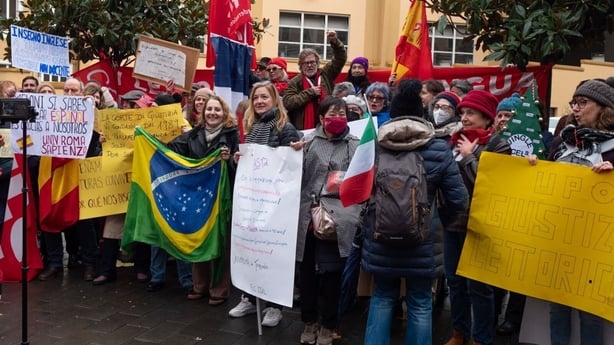When Henry Rodgers was a student in St Mel's College in Longford, he remembers the excitement when Ireland formally joined the European Economic Community, now known as the European Union.
The year was 1973 and, as the Longford native puts it, he felt the "the full span of possibilities that came with youth and freedom".
Little did he know that one day he would be pursuing a battle in Europe for equal employment pay and conditions. A battle that is now going on for 40 years.
"Back then there was an awful lot of talk about joining the EEC and what it would mean for us and of course, we were young and adventurous," Mr Rodgers recalls.
"It brought the possibility of being able to go abroad and work abroad.
"At that stage I felt the full span of possibilities that came with youth and freedom".
Mr Rodgers, originally from Longford town, has lived in Italy for 37 years and teaches English at Sapienza University of Rome.
He is part of a group of university lecturers in Italy, many of whom are Irish, who have been trying to get equal employment pay and conditions.
He, along with others - the so-called 'Lettori' - have campaigned tirelessly for decades for fairness and equality for non-national lecturers who are EU citizens.

As foreign lecturers, they receive significantly less pay and have less rights when it comes to contracts compared to Italian lecturers.
The group has fought the case in the EU Courts for the same employment conditions as Italian lecturers who were doing the same work.
They have won a total of four landmark rulings, but over the years the Italian authorities have responded with a mixture of inaction and administrative confusion to deny the Court verdicts.
European Commission opens an infringement case against Italy
In July 2023, the European Commission referred Italy to the European Court of Justice for its persistent discrimination against foreign lecturers working in Italian universities.
The European Commission has now opened an infringement case against Italy for persistent discrimination against non-national university lecturers.
However, Mr Rodgers said the Italians continue to blatantly ignore the rulings.
"The first thing is if you win in the court it should be automatic," he said.
"But we have had to go four times because they misinterpret the ruling so you have to go back for successive refinements of the ruling all the time.
"Even since the last ruling they have introduced four different pieces of legislation, some of them mutually contradictory, like to resolve it, I really don't know why they are being so intransigent."
Over the decades, the 'Lettori' have gained the support of Italy's biggest trade union FLC CGIL and many Irish MEP's have taken up the campaign.
They have held protests, talked to MEPs and continually raised the issue.
Calls for EC president to intervene
Now, Mr Rodgers has written directly to European Commission President Ursula von der Leyen appealing to her to ensure justice is done.
"She's the ultimate guardian of this treaty and in the letter, I'm just really coming from the perspective of a citizen," he said.
"The commission itself says the freedom of movement and parity of treatment are the most important rights under European Union law and they're an essential element of European citizenship.
"And I'm just trying to point out to President von der Leyen the formidable obstacles that exist, or at least exist in Italy, to actually asserting that right.
"It is a very important right, but it's also a very difficult right to protect because an individual doesn't have much resources and doesn't have the money for going to court time after time," he added.
Mr Rodgers also raises concerns about the confidentiality requirement in infringement proceedings.
"In other words if the European Commission sues a member state all the exchanges between them are confidential, which has cost us very dearly," he said.

He insisted the European Commission is supposed to be "doing it on our behalf" but the complainant has no right to see the depositions such as what the defendant is saying, which is the total opposite of the normal lawyer-client relationship.
Mr Rodgers said newly elected MEP for the Midlands North West Ciaran Mullooly has pledged to pursue the issue.
Going back to St Mel's College in Longford again, Mr Rodgers said Pat O'Rourke, now an adviser to Mr Mullooly, was in his class.
"He's raising questions," he said.
"It's a good moment to be Irish because what he's doing and what other Irish MEPs have done really reflects well on Irish people.
"They've been very supportive of us," he said.
Mr Rodgers acknowledges this battle has gone "an incredibly long time" but he is undeterred and believes Ms von der Leyen has the power to ensure justice is done.
The European Union was founded on values including human rights, freedom of movement and equality.
Mr Rodgers said 40 years on, he cannot believe how many obstacles have been placed in the way of attaining the right to parity of treatment.







